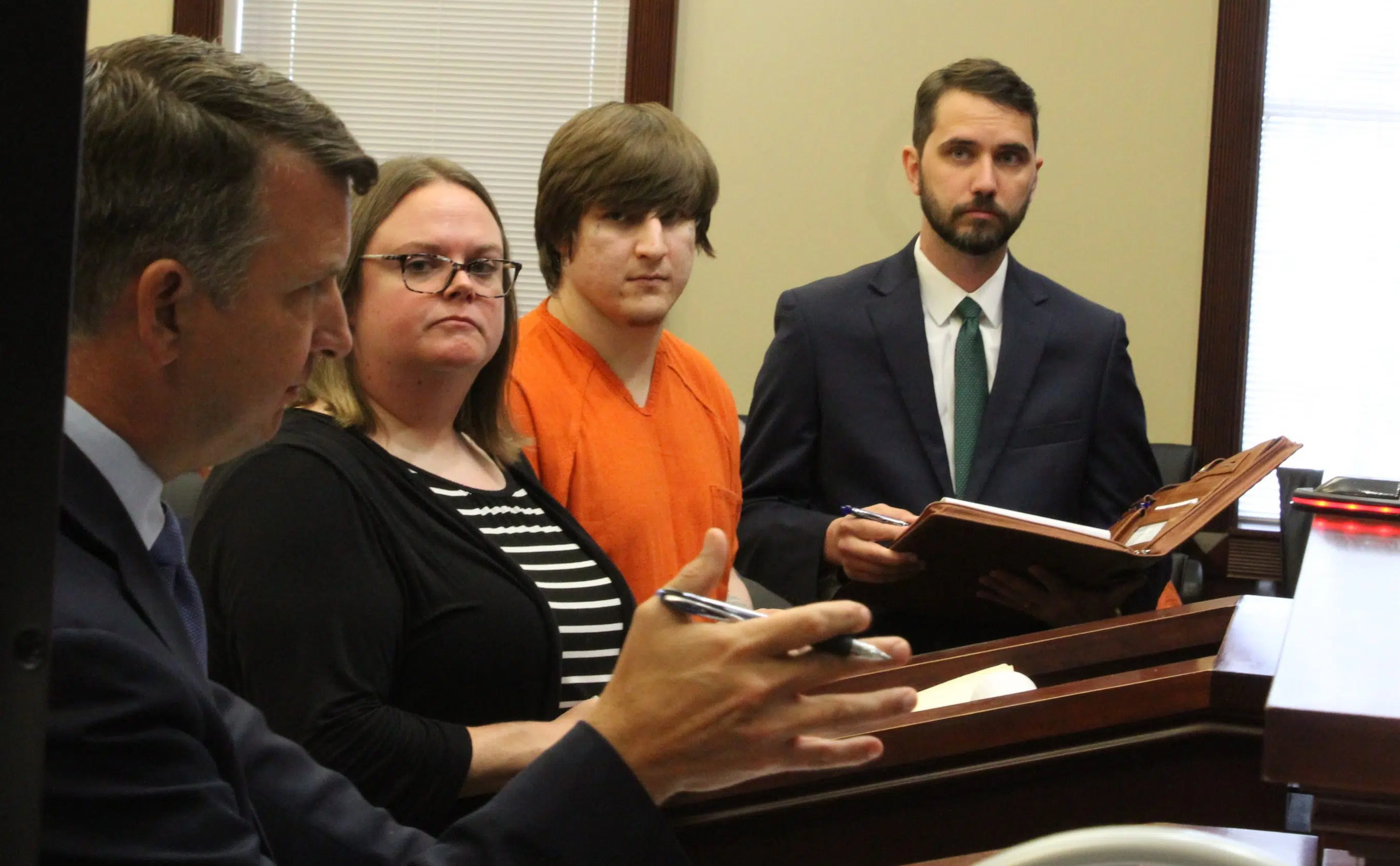By MELINDA J. OVERSTREET
for Glasgow News 1
The mental health of a Nashville man facing a possible death penalty in conjunction with charges of murder and first-degree robbery was the primary topic during his pretrial conference Monday in Barren Circuit Court.
Aaron Rodriguez, 26, is accused of fatally shooting Melissa Miller, 54, outside her Glasgow home in May 2021. He allegedly came to Glasgow on the premise that he – under a false name – was going to buy electronic equipment that had been posted for sale on Facebook by Miller’s grandson. Rodriguez is accused of firing a gun at Miller from the passenger seat of a vehicle driven by a female. Miller was transported to T.J. Samson Community Hospital, where she was pronounced deceased, according to the criminal complaint in the case.
A motion had been filed by the defense asking the court to rule that Rodriguez has a “serious mental illness,” and Commonwealth’s Attorney John Gardner opposed such a ruling. Defense attorney Wesley Boyarski said she had spoken with Gardner after filing the motion.
“I agree that – I’ve read his response – that I didn’t make a case sufficiently to ask the court to rule that Mr. Rodriguez has a serious mental illness,” she said. “As the court is aware, this is unprecedented ground. This is a new statute. What I probably should have styled the motion as is a motion for evidentiary hearing, so I’m not asking the court to make that ruling without a hearing. I would like to ask the court to schedule the hearing.”
Gardner has filed a notice that he intends to prosecute the case with the death penalty as an option, and Boyarski said that if it is determined that the defendant suffers from a serious mental illness, it would preclude the death penalty.
Gardner said the motion indicated that Rodriguez had been evaluated and suffers from bipolar disorder.
The statute in question says the defendant has to have a documented history and diagnosis, plus he has to have active symptoms of the mental illness at the time of the incident, Gardner said, and he didn’t think that was alleged in the motion.
He said that if the defense thinks they can meet those standards, they should have an evidentiary hearing where the prosecution has the opportunity to rebut the allegations.
He said he has filed a motion to have an “8.07 examination done,” referring to a criminal court procedural rule number.
Boyarski said she had not filed an 8.07 notice.
“I filed this notice. I don’t have a report from my expert yet …,” she said. “I’ll be glad to turn that over [to Gardner] when I get one.”
She said they got their evaluation done just in time for her expert to tell her orally what they’d found.
She asked the court that if an 8.07 evaluation were to be done, that it be limited to whether Rodriguez has a serious mental illness.
Alexander asked whether she meant that would be preferred over a regular competency evaluation.
“Yes, and that’s what I am opposed to just a general, let’s send him to KCPC and evaluate him for criminal responsibility. I object to that,” Boyarski said.
She offered to be the one to file an official 8.07 notice, and suggested that would trigger the commonwealth’s being entitled to that evaluation, as the state doesn’t specify that it is.
Gardner said he would expect that there could be a question of competency to stand trial at some point, so he suggested getting that evaluation done at the same time while Rodriguez would be at the Kentucky Correctional Psychiatric Center for the other, rather than have it come up at some future date and then have to wait again to be able to get him scheduled for it.
Boyarski said she was not opposed to that.
Alexander asked whether they had any ideas on how to get this done in a timely fashion, and Boyarski said she has had a recent experience because of a case in a different county with which she’s involved. The order for that evaluation at KCPC said it was to be done in 60 days, and the response was a respectful “We cannot comply,” and the soonest they could get to it was the next summer.
“They are extremely backed up, unfortunately, unless something drastic has changed in the last few weeks,” she said.
Ultimately, it was determined that Gardner would compose the suggested order for the two questions to be determined at KCPC and run it by Boyarski for her approval before submitting it to the judge for his signature, with Alexander’s noting that any evidentiary hearing would naturally need to come after the evaluations are done.
He also noted that the trial for Rodriguez is scheduled to begin Jan. 30, and the timing of getting the evaluation done could interfere with that.
Boyarski said she’s already spoken with the defendant about that possibility.
Portions of multiple weeks have been set aside for the trial.
Boyarski’s colleague Zanda Myers had filed a motion seeking certain types of evidence from the prosecution, and Gardner said he has been working on gathering the items from various agencies and just got the last of them Monday, so now that he had them, he would be filing a response. He said that if that response was then not satisfactory, they could schedule a hearing on it, and Alexander recognized it may not be necessary if Gardner provides everything requested, but he scheduled it for just shy of 30 days out to get the time on the docket. He said that by then he hoped to have received, signed and sent the order for the evaluation and they could also discuss next steps at that point.
Gardner also requested that he be provided with all of the documentation that the defense had provided to its expert who had evaluated Rodriguez, and Boyarski said she would get that to him along with the written results report once it’s completed.


Comments